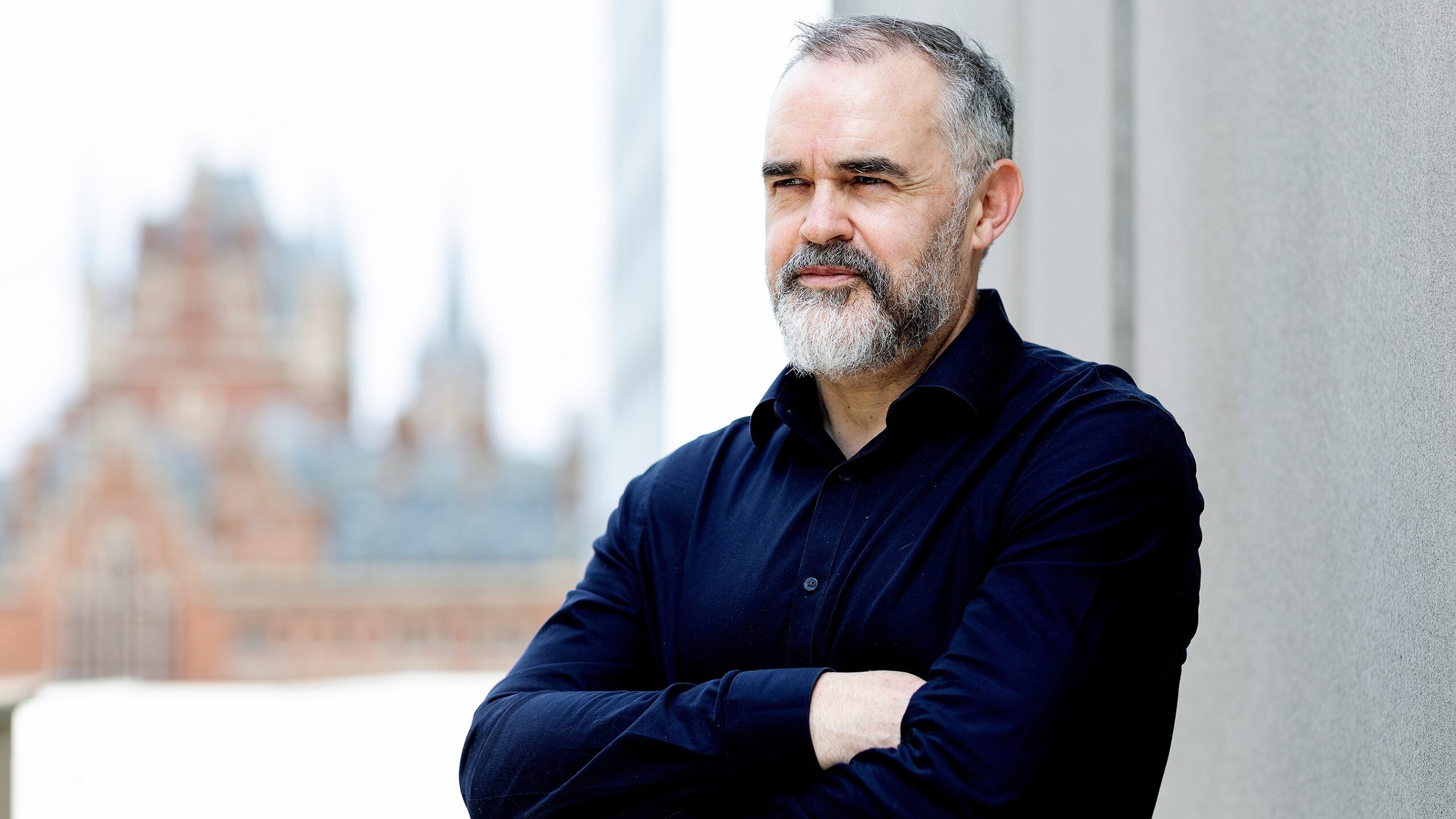Karin Smyth MP: I’m proud to say I was an NHS manager
As an NHS manager and MiP member implementing Andrew Lansley’s botched NHS reforms, Karin Smith decided parliament needed more politicians who understand how the NHS works. Now a Labour MP and shadow care minister, she discusses political landscape of healthcare with Matt Ross.

“When I was an NHS manager, people told me I was too political. And often, now that I’m a politician, people tell me I’m too managerial,” says Karin Smyth.
Indeed, Smyth’s identity as an NHS manager can’t be separated from her work as the MP for Bristol South, which has involved both scrutinising NHS and social care legislation as a member of the House of Commons Health and Care Bill committee, and serving as Labour’s shadow minister for social care.
It was, after all, Smyth’s commitment to social justice that first pulled her into the NHS: “I was motivated to join by the Black report on health inequalities,” she says, recalling Sir Douglas Black’s 1980 conclusion that the NHS “largely served the middle classes, and wasn’t doing anything to improve health outcomes”. For many years until her election to Parliament in 2015, she worked in planning, purchasing, commissioning and non-executive roles for health authorities and primary care trusts.
These jobs are so exciting
Smyth is an unabashed champion of NHS managers: “I don’t say: ‘I worked for the NHS.’ I’ll proudly say: ‘I was an NHS manager’,” she notes. These jobs are “just so exciting,” she says. “You’re doing something that is positive.” But she acknowledges that “the stereotypes do pervade” among her fellow MPs, some of whom see NHS managers as – depending on their political leanings – faceless bureaucrats or cold-hearted businesspeople. “It’s really unhelpful,” she comments, arguing that managers end up carrying the can for the tough decisions required to reform services or save taxpayers’ money.
By 2012, as a senior manager for South Bristol GP Consortium, Smyth was drafting a constitution for one of the clinical commissioning groups (CCGs) formed under then-health secretary Andrew Lansley’s wide-ranging health reforms. And at this point, her beliefs propelled her back out of the NHS and into full-time politics: it was Lansley’s change programme, she told the Commons in March, “that brought me to this place, so appalling was it”. His botched plans, she says now, demonstrated that “they needed more people in Parliament that knew about the health service – so I was going to go and do it!”
Prior to the 2010 election, she recalls, there had been a broad consensus between Labour and the Conservatives around the need to promote integration and collaboration: managers across the NHS were working steadily towards a clear goal. But Lansley’s reforms “completely destroyed the entire infrastructure” – creating huge uncertainty, killing off reform projects and wiping clean institutional memories.
Destruction and disorganisation
 “Local NHS leaders have lost that public accountability and I think managers have lost some of the experience to deal with that and front things up publicly. ”
“Local NHS leaders have lost that public accountability and I think managers have lost some of the experience to deal with that and front things up publicly. ”
Announcing major reforms, she argues, has the effect of “dropping a big missile” into any large organisation: “People start to scramble and move, and the trains start leaving the station – even though they don’t really know where they’re going.” So a long period of organisational change, leadership churn and slow reconstruction ensued, in which “the destruction and disorganisation stopped so much progress.”
Early fears that Lansley’s reforms would open the door to widespread privatisation soon receded, says Smyth: “It ran into the sand very quickly: we got caught up in hugely expensive bureaucratic exercises, and there are some obvious failures where it went very badly wrong.” But it took many years to re-establish the consensus around promoting collaboration; and meanwhile, she believes, NHS organisations became less accountable to the people they served.
In the pre-Lansley era of health authorities, she says, NHS leaders would painstakingly assemble convincing evidence, then make the case for proposed reforms to their community health councils and MPs. But Lansley’s reforms pulled their attention towards national DHSC bodies and regulators, with the result that local NHS leaders have “lost that public accountability; and I think managers have lost some of the experience to deal with that and to front things up publicly.”
A decade on, Smyth is now involved in unwinding Lansley’s reforms. The 2022 Health and Care Act was initially conceived as a “simple tidying-up exercise,” says Smyth, “giving statutory legitimacy to the [integrated care system] organisations that had evolved.” And in its final form, it does represent “the end of the worst bits of Lansley, in terms of [NHS trusts] competing with each other, the lack of collaboration and the need to tender all the time”.
Along the way, though, health ministers “took the view that this was their only parliamentary time to put in other things; and then it became what we call a ‘Christmas tree bill’.” As the department attached new and controversial provisions to the legislative vehicle, it ran into opposition.
Before resigning as health secretary in June 2021, for example, Matt Hancock inserted a requirement for NHS bodies to seek ministerial approval for every proposed service change. Amidst widespread concerns that this would cause delays and undermine local decision-making, the text was ultimately “watered down” to cover only complex and substantial changes – though these, Smyth points out, remain undefined. “The phrase the minister used in the end was that the health service would notify the secretary of state of things that were notifiable,” she says. What this means, “I have no idea”, she adds; we will, presumably, have to await the regulations.
Workforce is a massive problem
The decision to introduce changes to the social care costs cap – reducing the protection it offers to people with fewer assets – also hit headwinds, undermining the consensus around the 2014 Care Act’s proposals. “And now we’re working through the mechanics of the money with local authorities and providers, we’re very quickly seeing that it’s really complex, that it doesn’t stack up, and that it won’t work,” she comments. “Social care will remain a massive problem because of the workforce issue.”
Workforce is a “massive problem” across health and care, says Smyth: “The figures are really quite astonishing, and it’s only going to get worse.” The pandemic was “emotionally and physically draining” for staff in all roles, leading to an exodus of experienced people. And the wider UK jobs market is tight, while other countries “are offering better terms and conditions to the migrant workforce that we’ve always relied on in the NHS.” This unfolding crisis is increasingly obvious to the public: “So many people are going to be on waiting lists, or have their family on waiting lists, that they will see the acuteness of the problem.”
Asked how Labour would tackle the issue, Smyth emphasises the need to “encourage the skills base locally and home-grown talent”; she calls for more apprenticeships, retraining programmes, medical school places, and support for poorly-qualified NHS staff to develop their careers. The latter, she believes, “needs to be as important as keeping the lights on in A&E for trust chief executives.”
Meanwhile, she says, “we need to think much more imaginatively about the options to keep people in their late 40s to mid-50s” – currently leaving in droves. “We need their experience and perspectives to keep the system stable,” she says: better to offer them less pressurised roles, flexible working or even sabbaticals than to “lose that talent completely”.
Government must commit to producing a proper workforce strategy, says Smyth; the 10-year plan commissioned from NHS England and Health Education England will not fill the gap. “Pretty much everyone apart from the Treasury agrees that workforce is the number one issue now,” she comments, but HMT isn’t “admitting it’s a problem, because they’re worried about the finances.” It is, she adds, “very dispiriting that the damp hand of the Treasury is stopping anything coming forward”.
Focus on the local
In Smyth’s view, the HCA represents an improvement on what has gone before, but “leaves so much undone”. In particular, she argues that making senior NHS leaders more accountable to their communities could “focus people very much on the local,” counterbalancing top-down pressure from Whitehall. She tried to amend the HCA “to bring back something akin to the Appointments Commission for non-executive directors,” and to require that the chairs of Integrated Care Boards – the governing bodies of integrated care systems (ICSs) – should be directly elected, though she notes that this is not Labour Party policy.
After all, she says, Bristol elects a police and crime commissioner and – until May’s local referendum – a city mayor: “The budgets that they oversee are dwarfed by the budget of the CCG,” she points out, yet ICB chairs are appointed by the health secretary. “We are asking the public to pay more money for their health service,” she says – so “we need to give them more of a say in it, and they need to know it’s accountable to them.” It must also be transparent, she adds; the reduced pressure to run service tenders should mean that “there is no reason for these organisations to be deliberating about public matters of public policy in private.”
Strengthening local accountabilities, Smyth believes, could help NHS organisations rebuild the skills needed to win public support for service reforms. “You’ve got to be able to present the case, and to help people along that journey,” she says. “People will accept change if they know that there’s a benefit. And actually, politicians can be a really important part of that. We don’t always oppose things!”
Reaching out to politicians
Over the coming years, NHS leaders will be having many such conversations with local communities. The HCA does, Smyth believes, create “an opportunity for the ICSs where those relationships are good. I think there’s a real willingness to make them work, and I think NHS managers want to collaborate.” What’s more, she adds, “the pandemic has changed relationships locally for the good, because people have worked together, they’ve learned much more about their local communities, and NHS managers have become more confident about acting in the public and political sphere.”
So there’s now more potential to transform services and strengthen local collaboration. And Smyth urges NHS leaders and managers to reach out to local MPs, explaining the realities of health and care service delivery and making the case for positive changes.
“It’s a brave politician that stands up and says: ‘Yes, we’d like to close that hospital, close that department’,” she notes. “So it’s a difficult relationship.” But MPs “are persuadable of the benefits. If you tell me that this is going to save the lives of my constituents, if you tell me this is going to make life better, and you can demonstrate that, then I will work with that. And I think most people would.”
In Smyth’s view, senior leaders should contact their MPs, introduce themselves, and ask to discuss “what you propose in this local area. Most MPs will say: ‘Yes, great’.” Meanwhile, more junior managers can “ask to go to an MP’s surgery and talk through why they think the way they do about something. It’s about informing politicians about the challenges that you’re facing, and that’s a good thing.”
Over time, Smyth believes, these conversations “will expose people, both in the service and the public, to some of the issues and challenges – which means that, in turn, we can make the case for more funding and better targeted funding.” It may be uncomfortable engaging with politicians and the public over controversial service reforms, she concludes; but if we’re to move forwards, it’s essential: “We have to bring people with us on the demands of the future in order for the NHS to survive and thrive.”
Related News
-

Daniel Elkeles: “There’s a lot of green shoots here—the NHS is in a much better place”
As NHS Providers annual conference gets underway in Manchester, we speak to chief executive Daniel Elkeles about next year’s merger with the NHS Confederation and the future for NHS trusts in England. He tells Alison Moore that providers are “well placed” to deliver the Ten-Year Plan—but warns an unhappy workforce and a lack of investment could throw big spanners in the works.
-

Angela Hillery: “Nobody can do this on their own”
Angela Hillery, chief executive of community trusts in Northamptonshire and Leicestershire, is one of England most influential NHS leaders and a pioneer of collaborative working. She talks to Craig Ryan about why integrating services offers the best chance of overcoming a hostile environment and turning the NHS around.
-

We’ve given NHS management a home – we care for it and campaign for it
MiP is 20 years old this summer and its chief executive, Jon Restell, has been there since the beginning. He reflects on the union’s past, present and future in conversation with Healthcare Manager editor Craig Ryan.